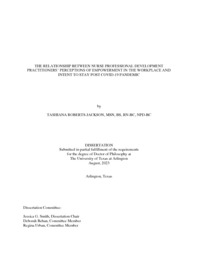
ATTENTION: The works hosted here are being migrated to a new repository that will consolidate resources, improve discoverability, and better show UTA's research impact on the global community. We will update authors as the migration progresses. Please see MavMatrix for more information.
Show simple item record
| dc.contributor.advisor | Smith, Jessica G. | |
| dc.creator | Roberts-Jackson, Tashiana | |
| dc.date.accessioned | 2023-09-27T16:30:26Z | |
| dc.date.available | 2023-09-27T16:30:26Z | |
| dc.date.created | 2023-08 | |
| dc.date.issued | 2023-08-15 | |
| dc.date.submitted | August 2023 | |
| dc.identifier.uri | http://hdl.handle.net/10106/31736 | |
| dc.description.abstract | Nurse Professional Development (NPD) practitioners in the acute care hospital setting are often undervalued despite their crucial role. During the COVID-19 pandemic, they demonstrated adaptability by rapidly transitioning to virtual formats for onboarding nursing staff, while also shouldering the responsibility of ensuring staff competency in caring for COVID-19 patients. Additionally, NPD practitioners faced heavy workloads, having to retrain nursing staff who worked in indirect patient care roles, while also filling in during critical staffing shortages. To date, no studies have been found that explored key factors that predict intent to stay in the NPD practitioner population pre- or post-pandemic. Thereby, to address this gap, this study’s purpose was to explore the relationship between NPD practitioners' perception of workplace empowerment and their intent to stay post COVID-19 pandemic. A cross-sectional, descriptive, and correlational design was employed. The study included 313 NPD practitioners from various backgrounds who worked in acute care hospitals across the United States. Employing linear regression analyses, the relationship between empowerment and intent to stay, was examined. Results indicated that NPD practitioners' perception of empowerment as a composite construct was significantly associated with their intent to stay, with higher levels of empowerment associated with a greater intent to stay (β =.32, p < .001). In a multivariate model, formal power (β = .150, p = .043) and access to opportunities (β =.149, p = .015) were most positively, significantly associated with intent to stay. These findings emphasize the importance of empowering NPD practitioners to promote their commitment to the organization. The study aligns with Kanter's theory of empowerment, highlighting that empowering work environments positively impact retention. Further research can explore other variables such as job satisfaction and work engagement. Overall, the study offers valuable implications to retain NPD practitioners and improve patient care outcomes in the evolving healthcare landscape. | |
| dc.format.mimetype | application/pdf | |
| dc.language.iso | en_US | |
| dc.subject | Structural empowerment | |
| dc.subject | Intent to stay | |
| dc.subject | NPD practitioners | |
| dc.subject | Clinical nurse educators | |
| dc.subject | Hospital setting | |
| dc.subject | COVID-19 | |
| dc.subject | Pandemic | |
| dc.title | THE RELATIONSHIP BETWEEN NURSE PROFESSIONAL DEVELOPMENT PRACTITIONERS’ PERCEPTIONS OF EMPOWERMENT IN THE WORKPLACE AND INTENT TO STAY POST COVID-19 PANDEMIC | |
| dc.type | Thesis | |
| dc.date.updated | 2023-09-27T16:30:26Z | |
| thesis.degree.department | Nursing | |
| thesis.degree.grantor | The University of Texas at Arlington | |
| thesis.degree.level | Doctoral | |
| thesis.degree.name | Doctor of Philosophy in Nursing | |
| dc.type.material | text | |
| dc.creator.orcid | 0009-0004-7523-6023 | |
Files in this item
- Name:
- ROBERTS-JACKSON-DISSERTATION-2 ...
- Size:
- 1.062Mb
- Format:
- PDF
This item appears in the following Collection(s)
Show simple item record


